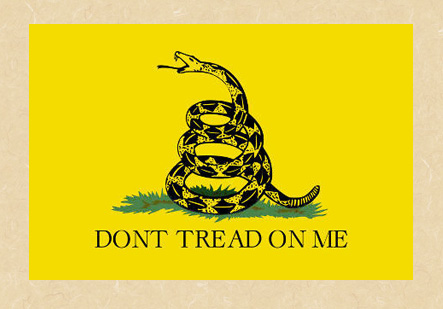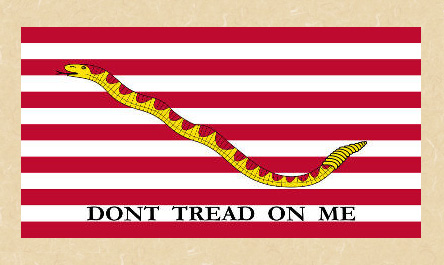Fortnight for Freedom, part 1: our Constitution guarantees freedom of religion, not freedom from religion.Rom. 6:18-23 & Rom. 13:11-14:4;
Matt. 8:5-13 & Luke 1:1-25,57-68,76,80. The Fourth Sunday after Pentecost & the Nativity of the Holy Prophet & Forerunner John the Baptist.
Return to ByzantineCatholicPriest.com. |
12:24 PM 6/24/2012 — Those of you who visit the parish web site may have noticed that, this week, I put the Gadsden Flag on it. I did it because today we're beginning our observance of the “Fortnight for Freedom,” a two week period of prayer and action, culminating on July 4th, in support of religious liberty. Now, you might think that putting the Gadsden Flag on the parish web site is a bit provocative given that the flag has, in recent years, been associated with the Tea Party, which is clearly a political movement; but, despite its use now as the emblem of a movement, it is a historical national flag; and, the regulations that govern the flying of the national standard permit the replacement of the Stars and Stripes with any historical flag that once flew as the flag of our country; the Gadsden Flag is one of those. Its use as a national standard goes back to before the Declaration of Independence.
In 1775, the Continental Navy was established to intercept British ships supplying the troops sent from England to repress the rebellion which everyone new was coming, and a small force of Marines was authorized to accompany the new Navy on its mission. They carried with them yellow drums with an image of a coiled rattle snake with thirteen rattles, and the words “Don't Tread on Me.”  Seven members of the Continental Congress served on the Marine Committee, including Colonel Christopher Gadsden of South Carolina. Before the new Navy shipped out on its mission, he had a flag made based on the design of the Marine drum, and presented it to Commodore Esek Hopkins, who flew it on the mainmast of his flagship during that first mission. Later, the Gadsden Flag would become the first national flag of the United States, but would soon be replaced by the Stars and Stripes after General Washington took command of the Continental Army. Seven members of the Continental Congress served on the Marine Committee, including Colonel Christopher Gadsden of South Carolina. Before the new Navy shipped out on its mission, he had a flag made based on the design of the Marine drum, and presented it to Commodore Esek Hopkins, who flew it on the mainmast of his flagship during that first mission. Later, the Gadsden Flag would become the first national flag of the United States, but would soon be replaced by the Stars and Stripes after General Washington took command of the Continental Army.
When the first Gulf War broke out, there was a movement to adopt the Gadsden Flag as a battle flag for American troops going into combat overseas, but the idea was rejected; but, a similar flag from around the same period, which shows an uncoiled snake on a field of thirteen stripes, and displaying the same “Don't Tread on Me” motto, was adopted by the Navy in the first Gulf War, and is still flown on all active duty Naval vessels as a Navy jack; which made it seem very awkward when, in 2009, the Department of Homeland Security issued a memo to the FBI that anyone flying the Gadsden Flag was to be considered a possible domestic terrorist. The memo was withdrawn when it was pointed out that both the Gadsden Flag and the Navy Jack were both used as national flags at different times in our country's history.
So what is the Fortnight for Freedom? It's a period of prayer, fasting, education and civil action in protest of the mandate by the Department of Health and Human Services for contraception, sterilization and abortion-inducing drugs as part of the new Affordable Health Care Act. While the White House as included an exemption clause that they say spares Catholic institutions from violating their religious convictions, it declares that something is not a Catholic institution if it serves, employs or has any dealings at all with non-Catholics, which would mean all of our Catholic hospitals and schools.
Now, one of the things that you might have found confusing in this debate is why so many non-Catholic organizations and individuals are choosing to stand with the Church in this fight against the current government, even though they certainly don't agree with Church dogma on birth control or even abortion; and, the reason for that is that the issue, from a Constitutional point of view, has nothing to do with whether you agree that abortion is murder or that contraception is opposed to God's natural law; it has to do with whether the government of the United States—or government at any level, for that matter—has the authority to define what it means to practice one's faith as a citizen, and whether the government has the power to restrict that in any way. Keep in mind that the Bill of Rights, on the subject of religion, says two things: not simply that “Congress shall make no provision for the establishment of religion,” which has been used to remove manger scenes from town halls and silence prayer at high school graduations; it also says the government will do nothing to “restrict the free exercise thereof,” or, as Ronald Regan once put it, “Our Constitution guarantees freedom of religion, not freedom from religion.”
During the 2008 presidential campaign, one of the two candidates—I won't mention which because, as a priest, I have to be cautious about political endorsements, even though it seems silly under the circumstances; but we'll follow the rules anyway—spent a lot of time going around trying to placate religious leaders, giving various speeches to groups like the Southern Baptist Convention, and at venues like the National Prayer Breakfast, talking about the importance of what he called our constitutional “freedom of worship”; and, for whatever reason, that phrase landed oddly on my ear, until it occurred to me that the Constitution says no such thing. What the Bill of Rights guarantees is not freedom of worship but freedom of religion, and there's a difference.  Freedom of worship means that I can go to whatever church I want and worship there any way I please; freedom of religion means that I can believe whatever I want, and live what I believe, and no branch of government can tell me I can't. It's an important distinction, because how I worship stays within the four walls of my church; what I believe goes with me everywhere I go, including the polling booth. It's almost as if the current government desires religion to be regarded as little more than a personal idiosyncrasy, like having a favorite food or wearing your hair a certain way or having a favorite chair; it's not supposed to influence how to perform your duties as a citizen. Freedom of worship means that I can go to whatever church I want and worship there any way I please; freedom of religion means that I can believe whatever I want, and live what I believe, and no branch of government can tell me I can't. It's an important distinction, because how I worship stays within the four walls of my church; what I believe goes with me everywhere I go, including the polling booth. It's almost as if the current government desires religion to be regarded as little more than a personal idiosyncrasy, like having a favorite food or wearing your hair a certain way or having a favorite chair; it's not supposed to influence how to perform your duties as a citizen.
What's depressing is that a lot of church-going people have, in fact, fallen into this way of thinking themselves, embracing a purely relativistic view of religion and faith, believing that all religions are of equal merit, that all morality is relative, that the whole religious sphere of life is nothing more than a personal preference. I gave up marriage and family and personal freedom to become a priest twenty-five years ago, not because I believe that all religions are the same and I simply prefer this one; I gave up those things and became a priest because I believe that this religion is true, that all other religions are lies, and I wanted to dedicate my life to convincing everyone I meet of this fact. As an American, I am guaranteed the right to live this way by God, or so says the Constitution written for us by our Founding Fathers. Those same Fathers also said that the institutions owned outright by me or any church or organization of citizens can be run any way that organization pleases, and how they choose to do it is none of the government's business.
What are the first words of the Constitution of the United States? Not “We the Government” or “I the President” or “We the Congress” or even “We the Supreme Court”; the first words are “We the People.” It's not a blueprint for society written by the government telling the people what that government will do; it's a blueprint for a society written by the people telling the government what it may not do. And one of the first things it tells the government it may not do is restrict, in any way, the exercise of religion or the living of a life of faith. That's why so many non-Catholics, who otherwise would stand against the Catholic Church on the individual issues involved, are today choosing to stand with the Church in this fight; because, if the government can tell the Catholic Church that it must provide abortions in Catholic hospitals, that it must provide contraception to employees and students in Catholic Schools, that it must place orphans with homosexual couples, that its priests must perform same-sex marriages, then it can tell anyone to do anything at all; and, our forefathers left their homes and came to these shores and fought a brutal, bloody war of revolution because they were tired of living that way someplace else. We cannot and must not sit by and allow the government of the United States to define for us what the word “Catholic” means, or which institutions are “Catholic enough” (which is what the HHS mandate attempts to do), or to rewrite the Constitution and deprive anyone of the rights guaranteed in it.
Don't make the mistake of thinking that this is all just a political issue, and part of the politics through which we have to suffer in an election year. The bishops of our country have asked us to preach on this issue and inform you about it because how this comes down will effect forever the future of the Catholic Church in this country; and, if the government gets away with it, it will ultimately effect the freedom of every single American, regardless of their faith. In the bulletin insert today are reproduced some words of George Washington, but I wish to conclude by repeating them for you:
If I could have entertained the slightest apprehension that the Constitution framed in the Convention, where I had the honor to preside, might possibly endanger the religious rights of any ecclesiastical society, certainly I would never have placed my signature to it; and if I could now conceive that the general government might ever be so administered as to render the liberty of conscience insecure, I beg you will be persuaded that no one would be more zealous than myself to establish effective barriers against the horrors of spiritual tyranny, and every species of religious persecution.
Father Michael Venditti
|

